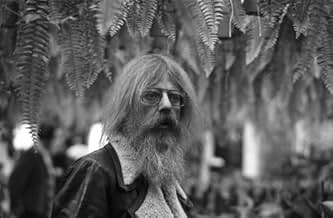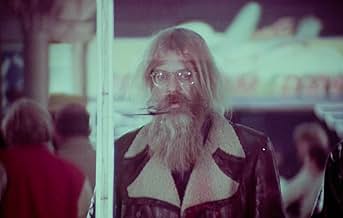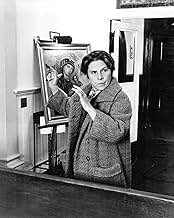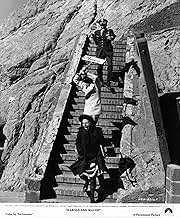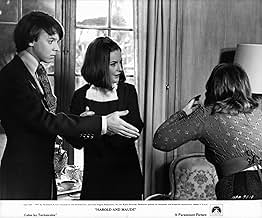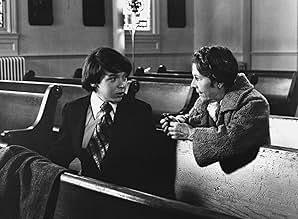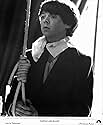Young, rich, and obsessed with death, Harold finds himself changed forever when he meets lively septuagenarian Maude at a funeral.Young, rich, and obsessed with death, Harold finds himself changed forever when he meets lively septuagenarian Maude at a funeral.Young, rich, and obsessed with death, Harold finds himself changed forever when he meets lively septuagenarian Maude at a funeral.
- Nominated for 1 BAFTA Award
- 3 wins & 3 nominations total
Tom Skerritt
- Motorcycle Officer
- (as M. Borman)
Ray K. Goman
- Police Officer
- (as Ray Goman)
Gordon De Vol
- Police Officer
- (as Gordon DeVol)
Sonia Sorel
- Head Nurse
- (as Sonia Sorrell)
- Director
- Writer
- All cast & crew
- Production, box office & more at IMDbPro
Featured reviews
The self-destructive and needy wealthy teenager Harold (Bud Cort) is obsessed by death and spends his leisure time attending funerals, watching demolishing of buildings, visiting junkyards, simulating suicides trying to get attention of his indifferent, snobbish and egocentric mother and having sessions with his psychologist. When Harold meets the anarchist seventy nine year-old Maude (Ruth Gordon) at a funeral, they become friends and the old lady discloses others perspectives of the cycle of life for him. Meanwhile his mother enlists him in a dating service and tries to force Harold to join the army. On the day of the eightieth anniversary of Maude, Harold proposes her but he finds the truth about the end of the cycle of life.
The cult "Harold and Maude" was a huge success in Brazil for people of my generation with a refreshing and funny exposition of themes like death, love and life through the friendship and love of a teenager and a septuagenarian woman. The complex Harold is a young man that needs the attention of his indifferent mother. He found in his childhood the only moment that she really seemed to be worried about him after a serious accident in school and he uses to fake suicides trying to have the same attention back. Maude is an anarchist old woman not attached to material stuff like properties or collections that steals cars for self-locomotion. Along a few days, Maude gives a lesson of life to Harold, changing his behavior and feelings forever. The performances of Ruth Gordon and Bud Cort in this weird love story are unforgettable and the soundtrack with Cat Steven's songs is another plus. Unfortunately "Harold and Maude" has been forgotten in Brazil by the distributors and neither the VHS nor the DVD has been released in my country; I just have a tape recorded from the cable TV. My vote is eight.
Title (Brazil): "Ensina-me a Viver" ("Teach me to Live")
The cult "Harold and Maude" was a huge success in Brazil for people of my generation with a refreshing and funny exposition of themes like death, love and life through the friendship and love of a teenager and a septuagenarian woman. The complex Harold is a young man that needs the attention of his indifferent mother. He found in his childhood the only moment that she really seemed to be worried about him after a serious accident in school and he uses to fake suicides trying to have the same attention back. Maude is an anarchist old woman not attached to material stuff like properties or collections that steals cars for self-locomotion. Along a few days, Maude gives a lesson of life to Harold, changing his behavior and feelings forever. The performances of Ruth Gordon and Bud Cort in this weird love story are unforgettable and the soundtrack with Cat Steven's songs is another plus. Unfortunately "Harold and Maude" has been forgotten in Brazil by the distributors and neither the VHS nor the DVD has been released in my country; I just have a tape recorded from the cable TV. My vote is eight.
Title (Brazil): "Ensina-me a Viver" ("Teach me to Live")
'Harold & Maude' is one of those 'sleeper' films that just seems to resonate that bit more with every passing year. Harold, played by the criminally under-utilized Bud Cort, is the quintessential disaffected rich kid wanting to find some meaning in a vacuous life who hooks up with the devil-may-care Maude through their mutual love of attending funerals (Joyce's word 'fun-for-all' springs readily to mind in those scenes). There is plenty to love about this film, the slower pace and the lampooning of easy targets, the 'gung-ho' military uncle and the fetishist priest for example. Here is a film that really stands up well to repeated viewings.
If so irreverent a story were to be told today, how would one react? As was probably the case when the film was released, people would probably find the theme edgy, if not inappropriate.
Such is the case with the cult film `Harold and Maude.' It openly explores themes of suicide, love, death and life with a fresh perspective.
The interesting part is how this film will likely find you. In most societies, an older man will likely fall for a woman years his junior. However, Harold (Bud Cort)-a shy teenager with an affinity for death-meets his 80-year-old true love Maude (Ruth Gordon), not at a dance or social event, but at funerals. The meeting almost seems reminiscent of Edward Norton's character's support group addiction in `Fight Club.'
Harold loves the attention he gets from staging fake suicides to frighten his obtuse and superficial haute-culture mother. In a reaction, she enlists him in a computer dating service in a vain matchmaking attempt to fix him up with Beetle-driving yuppies-to-be. The beauty is he frightens off all his prospective mates with cleverly staged fake suicides. At the same time, he meets Maude, a free-spirited senior who teaches him to appreciate life. After spending more time with her, he finds himself in love with her. However, a barrage of authority-i.e. priests, army-loving uncles and a psychiatrist-urge him not to follow through with his relationship.
`Harold and Maude' plays on '60s-esque themes of anti-establishment and open minds. Harold's militaristic uncle comes across as comical in his war-mongering vices-right down to his armless right sleeve that salutes when he pulls the string. Harold seems unhappy though he's surrounded by extravagance that rivals anything on MTV's `Cribs.' Not only that but his mother's lack of sense and indifference to her son mirrors her addiction to affluence. In addition to the swarm of brides-to-be, she tries to pacify him with material possessions-including a spanking-new Jaguar convertible, which he converts into a hearse.
Cat Stevens' open-air, acoustic-driven rock 'n' roll provides the soundtrack for the film. It gives the film a decent organic sound indicative of its demeanor.
This is a film that chases happiness wherever it can be found with a Woodstock-sense of responsibility. Maude's vices of vehicular larceny and bong smoking match Harold's love of fake hara-kiris and hearses. In a way, this movie comes across as a bit dated in that time has indeed erased the '60s anticipation of The Age of Aquarius and replaced it with `Fight Club' desperation.
However what the film lacks in reality, it makes up for in heart. This movie is not meant to be taken seriously; it's only to break down paradigms of societal thought.
Such is the case with the cult film `Harold and Maude.' It openly explores themes of suicide, love, death and life with a fresh perspective.
The interesting part is how this film will likely find you. In most societies, an older man will likely fall for a woman years his junior. However, Harold (Bud Cort)-a shy teenager with an affinity for death-meets his 80-year-old true love Maude (Ruth Gordon), not at a dance or social event, but at funerals. The meeting almost seems reminiscent of Edward Norton's character's support group addiction in `Fight Club.'
Harold loves the attention he gets from staging fake suicides to frighten his obtuse and superficial haute-culture mother. In a reaction, she enlists him in a computer dating service in a vain matchmaking attempt to fix him up with Beetle-driving yuppies-to-be. The beauty is he frightens off all his prospective mates with cleverly staged fake suicides. At the same time, he meets Maude, a free-spirited senior who teaches him to appreciate life. After spending more time with her, he finds himself in love with her. However, a barrage of authority-i.e. priests, army-loving uncles and a psychiatrist-urge him not to follow through with his relationship.
`Harold and Maude' plays on '60s-esque themes of anti-establishment and open minds. Harold's militaristic uncle comes across as comical in his war-mongering vices-right down to his armless right sleeve that salutes when he pulls the string. Harold seems unhappy though he's surrounded by extravagance that rivals anything on MTV's `Cribs.' Not only that but his mother's lack of sense and indifference to her son mirrors her addiction to affluence. In addition to the swarm of brides-to-be, she tries to pacify him with material possessions-including a spanking-new Jaguar convertible, which he converts into a hearse.
Cat Stevens' open-air, acoustic-driven rock 'n' roll provides the soundtrack for the film. It gives the film a decent organic sound indicative of its demeanor.
This is a film that chases happiness wherever it can be found with a Woodstock-sense of responsibility. Maude's vices of vehicular larceny and bong smoking match Harold's love of fake hara-kiris and hearses. In a way, this movie comes across as a bit dated in that time has indeed erased the '60s anticipation of The Age of Aquarius and replaced it with `Fight Club' desperation.
However what the film lacks in reality, it makes up for in heart. This movie is not meant to be taken seriously; it's only to break down paradigms of societal thought.
This art house favorite is a timeless classic and recommended viewing for all post-Catcher In the Rye teenagers. To modern viewers, the Ruth Gordon creation of Maude probably seems trite, but her Maude was fresh, original and daring in 1970 and the pre-Sophie's Choice twist in her history that Harold discovers was likewise unanticipated by early viewers. Unfortunately, Ruth Gordon went on to recreate this character in lesser films throughout that decade and the character of the eccentric old lady has become rather shopworn.
The Cat Stevens soundtrack is probably one of the most effective use of pop music in film ever.
The Cat Stevens soundtrack is probably one of the most effective use of pop music in film ever.
The most indie-esque film to come out of the '70s that I have seen, "Harold and Maude" wallows in irreverence. Suicide is played around with as a theme - never trivialised, but used frequently as a source of dark humour. The unlikely relationship between the titular characters is remarkably sweet and loving, if a little rushed, and the jaunty folk soundtrack uplifts the mood despite the heavy themes. The script is superlative, counterbalancing all the incidents of gore; the film almost comes across as a pre-emptive "Breakfast Club" for the "Fight Club" generation. Desperation and listlessness weighs Harold down, until Maude lightens his existence by showing him how to live for once. Her bubbly persona is the yang to his yin, and the film's quirky comedy cheers the audience as well as Harold with its subtlety. A true unexpected pleasure, "Harold and Maude" is surprising and charming throughout, with enough dark substance to mark it out as truly unique.
Did you know
- GoofsWhen Maude pulls the banjo out of a cabinet, you see the reflection of crew and lights.
- ConnectionsEdited into The Kid Stays in the Picture (2002)
Details
- Release date
- Country of origin
- Language
- Also known as
- Enséñame a vivir
- Filming locations
- 10 Stacey Court, Hillsborough, California, USA(Chasen Family mansion)
- Production company
- See more company credits at IMDbPro
Box office
- Budget
- $1,200,000 (estimated)
- Gross worldwide
- $4,535
Contribute to this page
Suggest an edit or add missing content


![Harold and Maude: The Criterion Collection [Blu-Ray]](https://m.media-amazon.com/images/M/MV5BMTMyMzU1YjgtMDhkYS00NzlkLWFjNzgtMGQwNjEwMjdjYTAyXkEyXkFqcGdeQXVyNzU1NzE3NTg@._V1_QL75_UX500_CR0)

